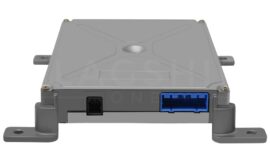Last updated on November 1st, 2024 at 11:56 am
The Acura NSX, introduced in 1990, has been a game changer in the realm of supercars. Often referred to as “Japan’s first supercar,” the NSX was designed with a singular vision – to combine the raw power of a supercar with everyday drivability. This high-performance vehicle originated as a concept car named the “NS-X”, an acronym for “New Sports eXperimental.” Over the years, the NSX has undergone several transformations, redefining speed and agility in the automotive world.
The Electronic Control Unit (ECU) plays a critical role in the NSX’s outstanding performance, with the Engine Control Module (ECM) and Powertrain Control Module (PCM) being key components. The ECM, managing the engine’s functions, optimizes fuel combustion, thus ensuring maximum power output and efficiency.
Simultaneously, the PCM, controlling both the engine management and transmission, harmonizes these systems to deliver optimal speed, power, and fuel efficiency. It’s through this synergy of advanced control modules that the Acura NSX achieves its supercar status, demonstrating the high standards of automotive excellence that Flagship One, Inc. stands behind.

The ECU’s Role in the NSX
The ECU in the Acura NSX serves as the brain of the vehicle, seamlessly coordinating various high-performance systems. The ECM, a critical part of the ECU, communicates with sensors around the engine, interpreting data to adjust important variables such as fuel mixture, ignition timing, and idle speed. This allows the engine to achieve maximum power output, fuel efficiency, and emissions control, while maintaining optimal performance in varying driving conditions.
Meanwhile, the PCM, another vital ECU component, manages the interaction between the engine and transmission, ensuring precise gear changes and optimal power delivery for an exhilarating driving experience. In essence, the ECU, with its ECM and PCM, ensures the NSX’s high-performance systems work in harmony, delivering the remarkable speed and agility that the vehicle is celebrated for. The robustness of these components underscores the commitment of Flagship One, Inc. to automotive excellence.
Benefits of a High-Quality ECU
A high-quality ECU significantly boosts the NSX’s performance metrics, translating into improved speed, superior handling, and enhanced fuel efficiency. With an optimized ECM and PCM, the supercar’s engine operates at peak efficiency, delivering an impressive acceleration that sets the NSX apart. The ECM’s precise fuel-to-air ratio adjustments and ignition timing contribute to a noticeable increase in horsepower, giving the NSX its renowned speed and power.
The PCM, on the other hand, fine-tunes the transmission control, ensuring smooth gear transitions for outstanding handling and cornering abilities. Furthermore, by maintaining optimal engine health, a high-quality ECU can extend the lifespan of your NSX, saving on long-term maintenance costs. Investing in a top-tier ECU from a trusted provider like Flagship One, Inc. ensures you’ll unlock the full potential of your Acura NSX, experiencing the thrill of supercar performance on every drive.
The Risks of a Subpar Acura NSX ECU
A substandard ECU can seriously compromise the performance of your Acura NSX, and in certain circumstances, even pose a safety risk. A poorly performing ECM can cause irregularities in fuel-to-air ratio and ignition timing, compromising the engine’s power output and efficiency. This can result in noticeable performance degradation, including reduced acceleration, erratic handling, and decreased fuel efficiency.

Moreover, a subpar PCM can lead to miscommunication between the engine and the transmission, resulting in rough or untimely gear changes that affect the vehicle’s drivability and comfort. Prolonged use of a faulty ECU can also lead to premature engine wear, potentially causing expensive damage and raising long-term maintenance costs.
From a safety perspective, a substandard ECU can fail to accurately interpret sensor data, leading to critical failures in systems like the Anti-lock Braking System (ABS) or the Electronic Stability Control (ESC). These systems rely heavily on the ECU to function correctly and are integral to the safe operation of the vehicle. Unpredictable vehicle behavior due to ECU failures could potentially result in accidents, emphasizing the importance of a high-quality ECU like those provided by Flagship One, Inc. to ensure both performance and safety of your Acura NSX.
DIAGNOSTIC TROUBLE CODES THAT RELATES TO THE PCM
Diagnostic Trouble Codes (DTCs) are codes that are stored by a vehicle’s on-board diagnostic (OBD) system when it detects a fault with the vehicle’s powertrain system.
P0100: Mass or Volume Air Flow Circuit Malfunction
P0101: Mass or Volume Air Flow Circuit Range/Performance
P0102: Mass or Volume Air Flow Circuit Low Input
P0103: Mass or Volume Air Flow Circuit High Input
P0110: Intake Air Temperature Circuit Malfunction
P0113: Intake Air Temperature Sensor 1 Circuit High
P0172: System Too Rich (Bank 1)
P0120: Throttle/Pedal Position Sensor/Switch “A” Circuit Malfunction
P0130: Oxygen Sensor Circuit Malfunction (Bank 1, Sensor 1)
P0131: Oxygen Sensor Circuit Range/Performance (Bank 1, Sensor 1)
P0132: Oxygen Sensor Circuit High Voltage (Bank 1, Sensor 1)
P0133: Oxygen Sensor Circuit Slow Response (Bank 1, Sensor 1)
P0134: Oxygen Sensor Circuit Intermittent (Bank 1, Sensor 1)
P0135: Oxygen Sensor Circuit Malfunction (Bank 1, Sensor 2)
P0136: Oxygen Sensor Circuit Range/Performance (Bank 1, Sensor 2)
P0137: Oxygen Sensor Circuit Low Voltage (Bank 1, Sensor 2)
P0138: Oxygen Sensor Circuit High Voltage (Bank 1, Sensor 2)
P0139: Oxygen Sensor Circuit Intermittent (Bank 1, Sensor 2)
P0140: Oxygen Sensor Circuit Malfunction (Bank 2, Sensor 1)
P0141: Oxygen Sensor Circuit Range/Performance (Bank 2, Sensor 1)
P0142: Oxygen Sensor Circuit Low Voltage (Bank 2, Sensor 1)
P0143: Oxygen Sensor Circuit High Voltage (Bank 2, Sensor 1)
P0144: Oxygen Sensor Circuit Intermittent (Bank 2, Sensor 1)
Here is a list of some diagnostic trouble codes (DTCs) that begin with the letter “U” and could potentially indicate a fault with the powertrain control module (PCM) in a vehicle:
U0100: Lost Communication with Engine Control Module/Powertrain Control Module
U0101: Lost Communication with Transmission Control Module
U0102: Lost Communication with Transfer Case Control Module
U0103: Lost Communication with Throttle Actuator Control Motor Circuit
U0104: Lost Communication with Throttle Actuator Control Motor Circuit Range/Performance
U0105: Lost Communication with Throttle Actuator Control Motor Circuit Low
U0106: Lost Communication with Throttle Actuator Control Motor Circuit High
U0107: Lost Communication with Throttle Actuator Control Motor Circuit Intermittent
U0108: Lost Communication with Throttle Actuator Control Motor Circuit Open
U0109: Lost Communication with Throttle Actuator Control Motor Circuit Short to Ground
U0110: Lost Communication with Throttle Actuator Control Motor Circuit Short to Battery
U0111: Lost Communication with Throttle Actuator Control Motor Circuit Short to Power
U0112: Lost Communication with Throttle Actuator Control Motor Circuit Short to Ground
U0113: Lost Communication with Throttle Actuator Control Motor Circuit Short to Battery
U0114: Lost Communication with Throttle Actuator Control Motor Circuit Short to Power
U0115: Lost Communication with Throttle Actuator Control Motor Circuit Failure
U0116: Lost Communication with Throttle Actuator Control Motor Circuit Range/Performance
Note: These codes are just a small sample and there are many other DTC codes that could potentially indicate a fault with the PCM. Additionally, the specific codes that are relevant will depend on the make and model of the vehicle. It is important to consult the vehicle’s service manual or a professional mechanic for more information about interpreting DTC codes.





